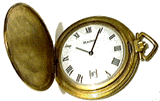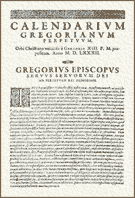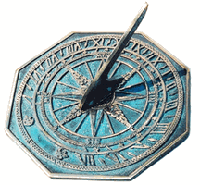| (insert your NIE or newspaper logo here) |
Weekly Online LessonOnline Lesson ArchiveGrade Level: 5-10
|
Good Timing
 "Happy New Year!" was shouted around the world last week — time zone by time zone — as people watched their clocks tick to midnight and celebrated the turning of the calendar.
"Happy New Year!" was shouted around the world last week — time zone by time zone — as people watched their clocks tick to midnight and celebrated the turning of the calendar.
Along with the celebrations, came reflections on the past year, perhaps some wishing they could turn back time and do things differently. Others made resolutions for themselves — like spending more time with their family, limiting the amount of television they watch to just an hour a day, to work harder on running a seven-minute mile, or maybe to lose a few extra pounds by next month.
Time has definitely been heavy on people's minds, so let's take it all a bit further. This week you'll explore what time is, how humans have measured it, how today's timekeeping is done, and how time influences our lives.
 Timing Is Everything
Timing Is Everything
Let's start fairly big by looking at Calendars Through the Ages at WebExhibits. Click on Next, to go to Our Year and read the overview. What are the significance of the sun and moon? What is a "synodic month"? What forces influence the actual length of each year?
Move on to the next section, Astronomy. How much do the Tropical Year and Sidereal Year vary? Why do the cycles change, and how does that affect our timekeeping? What is the difference between an equinox and a solstice? How did astronomers influence the calendar?
In the History of the calendar, you'll discover how January 1 became the first day of the new year. In what ways did the Romans shape the calendar we use today? Why is February different from the other months?
 You should also get familiar with the Definitions, and see when the International community largely adopted the Gregorian calendar. How long did it take for the majority of the world to get in sync? What often happened when countries shifted from the Julian to the Gregorian? When did the United States adopt the current calendar?
You should also get familiar with the Definitions, and see when the International community largely adopted the Gregorian calendar. How long did it take for the majority of the world to get in sync? What often happened when countries shifted from the Julian to the Gregorian? When did the United States adopt the current calendar?
Now check out the world's Various Calendars. Start with the calendars currently in use — the Chinese, Christian, Indian, Islamic, Jewish, and Others.
Then browse the calendars not used any more the Ancient, French, Future, Mayan, and Roman.
In what ways are these calendars different? In what ways are they similar? What exactly is the foundation of each calendar — astronomical calculations, human events, religious beliefs, or a mixture of these?
Now break down the years and months, and find out how Our Week evolved. What are some of the theories about why the number seven was used? How do days of the week mean different things to different cultures? Can you calculate the day you were born based on your birth date? If you already know what day you were born, calculate someone else's birth day.
 Let's break down time into even smaller units of measurement, and take A Walk Through Time at the National Institute for Standards and Technology.
Let's break down time into even smaller units of measurement, and take A Walk Through Time at the National Institute for Standards and Technology.
Since you've already spent a lot of time looking at calendars, begin your walk in the Early Clocks gallery. What are a clock's two basic components? How were the sun and water clocks different in design and measurement?
Next, read about A Revolution in Timekeeping and The "Atomic" Age refined our measurements of time. How did advances in science influence timekeeping technology that became available to the general public?
Lastly, go to World Time Scales and Time Zones. How did Greenwich Mean Time (GMT) become the standard reference point? When did the United States adopt the time zone system? Why do you think the railway adopted the time zone agreement so quickly, even before the American government did?
How has our understanding, measurement, and use of time changed over the millennia? What forces have driven those changes?
Newspaper Activities
Examine a current issue of Targetnewspaper, and highlight every reference to time you can find, including dates, days, hours and minutes. How might things look or work differently if people didn't use a standard way of measuring and observing time? Think about bus and airlines schedules, mail deliveries, meeting with friends, business hours of retail stores and restaurants, movie times, etc. How would watchmakers need to make different types of timekeeping devices for different customers?
© Copyright 2004
Learners Online, Inc.
